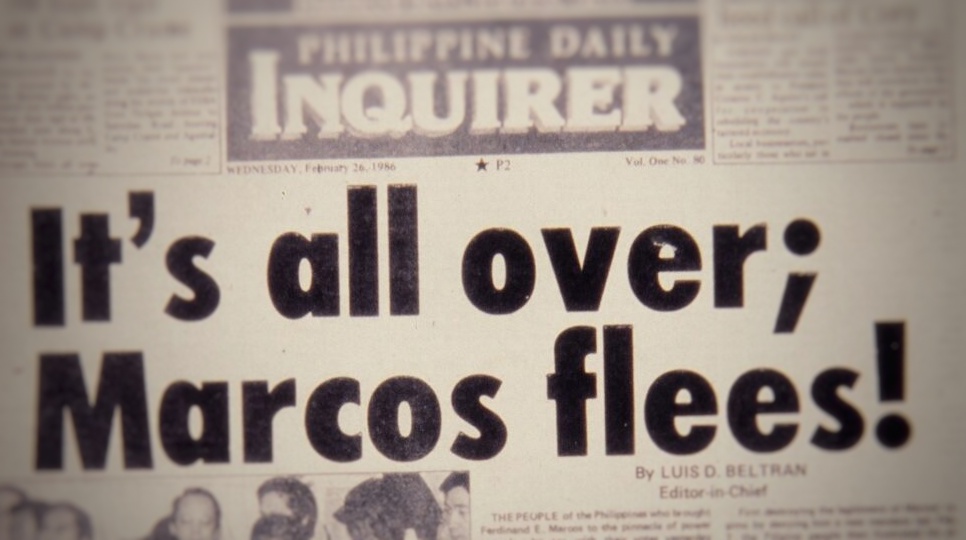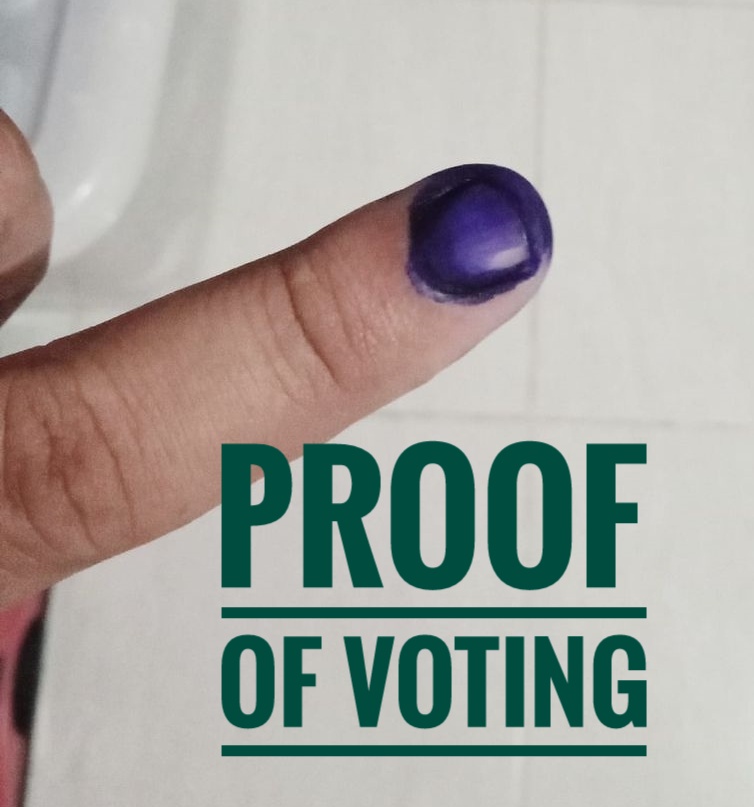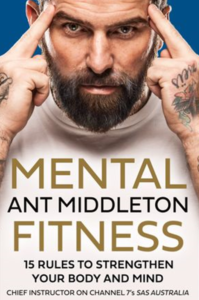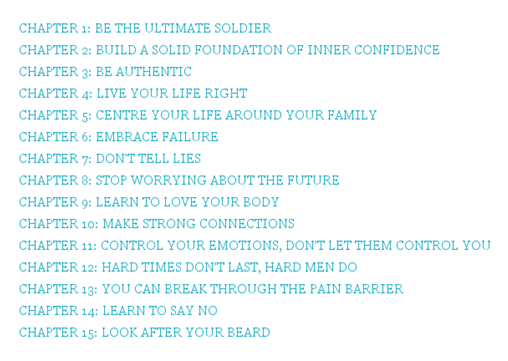Blogs
Moral authority: lessons from the Philippines (10 May 2022)
This weeks’ news headlines for the Philippines presidential election say it all: Dictator’s son Bongbong Marcos … sweeps to landslide win … reversal of family fortunes …
Who would have thought this, back in 1986 when the People Power Revolution forced his father, the then president, to flee the country in shame? I was there. Here’s a quick history of the event that made the world take notice of Filipino-orchestrated people power and moral authority.
people power! 
In 1972 President Ferdinand Marcos declared martial law to counter increasing discontent around his government’s widespread graft and corruption. Over the next 15 years opposition and open rebellion (fuelled by the assassination of Marcos’s fiercest critic, Senator Benigno Aquino) culminated in the People Power Revolution that ousted Marcos from power in 1986.
Marcos called a snap presidential election for 7 February in response to a sustained campaign of civil resistance that followed Aquino’s assassination. Corazon Aquino, wife of the slain senator, announced her candidacy. Marcos belittled Aquino as a housewife with experience in the kitchen, but no experience of politics or running a country. ‘He is correct,’ Cory Aquino retorted. ‘I have no experience of corruption, of ordering enemies to be killed, of stealing and hoarding public money, of fraudulent excesses of public resources for the personal gains of self or cronies.’ The media and populace roared with delight at her fearless condemnation of the Marcos regime.
Unable to defeat growing evidence of election fraud, a military rebellion, and a human barricade of thousands of protesters in Manila, Marcos and his family fled 18 days after the elections. Crowds who forced their way into Malacañang Palace discovered Imelda Marcos’s excesses, not least of which were store rooms for about 1,200 pairs of expensive designer shoes, fashionable dresses, and boxes of sunglasses and umbrellas.
It was a sublime and memorable moment of triumph and reflection. My friend, Pastor Jun Gonzaga, found it difficult to explain his feelings on a night when the only president and government apparatus he had known in his life was overthrown. It was a moment for relief, joy, and hopeful anticipation, but also apprehension for what might follow.
dislodging a corrupt legacy 
However, the long-suffering Filipino nation discovered it was not easy to dislodge a corrupt legacy. Deeply rooted problems required long-term reform and solutions. Six coup attempts attempted to overthrow President Aquino in the next year or so.
Socioeconomic and political realities only heightened tensions at all levels of society. Violent national strikes raged against increased oil prices and public transport fees. Insurgents (reportedly communists) attacked evangelical churches and military and police buildings in provincial areas.
To my mind, a major newspaper inadvertently captured and preserved on its front page the confused and competing realities of those days. Colourful advertisements tempted well-off readers with hi-fi audio equipment, holiday packages at a luxurious beach resort, and an easy-to-access credit card. Those goods and services sat side-by-side with—and in stark contrast to—news of civil and social unrest: communist insurgents held 83 people hostage; citizens had set up vigilante groups to assist police and military to maintain law and order; a crackdown by a new customs commissioner to root out graft within the customs department had doubled the collection of import duties; investigators were searching for 700 vehicles purchased for government use but gifted by Marcos to people to whom he owed repayment for various favours.
What others are saying: What the Marcos’ return to power means for the Philippines – BBC News
moral authority
Communists established New People’s Army strongholds throughout the Philippines to overthrow the Marcos regime.
The NPA demanded Aquino release incarcerated detainees, claiming they had been illegally detained by the Marcos regime. Aquino decided to draw a line between the authoritarian, corrupt and often brutal rule of the past and her incoming government, which she wanted to govern with public decency and justice.
Aquino’s profound words, ‘We have the moral authority’, have long echoed in my life. It’s an offer of trust and a just solution to complex and contested forces and ideas, while retaining authority for action should that trust be trampled. Martin Luther King said something similar two decades earlier during the civil rights movement in the USA: ‘In the process of gaining our rightful place we must not be guilty of wrongful deeds. Let us not seek to satisfy our thirst for justice by drinking from the cup of bitterness and hatred’.
The central impetus of a moral authority is elegant in its simplicity, a magnificent aspiration to be achieved in a sober but never passionless way.
elections, voters, trust 
Aquino’s words came back to me as I read the Facebook posts of 2 Filipino friends as they reacted to this week’s presidential election that Bongbong Marcos has won (I know their votes were cast to other candidates).
Arnold waited more than 12 hours in a queue to vote and although “it wasn’t easy,” he said, “it’s worth the sacrifice.”
Shawn reflected: “Passionate as we may be with our vote and convictions, we have to remain grounded that we are not better than others just because of our choice of candidate . . . After all the ruckus, the Philippines is, by and large, still a democracy where one can exercise freedom of speech, association, religion, consent, and suffrage. Democracy has its imperfections, but that is the price we pay for the rights we so love to exercise.”
In democracies, political leaders are offered a position of trust by a majority of voters who retain the moral authority to act without bitterness and hatred should that trust be trampled. Elegance in its simplicity. A magnificent aspiration.
That’s a message for Australian voters and candidates in the federal election this month.
- The 1986 long-story-short with photos https://thebamboocamel.com.au/8-revolution-mass-media-and-social-change/
- Extracts from Revolution, Mass Media and Social Change, Chapter 8, Ascent Crest Perspective: the making of a bamboo camel https://thebamboocamel.com.au
- Buy your hard copy or claim your discount code for the EPUB version.
An Ant and a bamboo camel (15 April 2022)

Ant Middleton, Chief Instructor on SAS Australia, has written another self-help book. The subtitle of Mental Fitness says it all: 15 rules to strengthen your body and mind (HarperCollins Publishers).
Best known in Australia for his central role in Channel 7’s series SAS Australia, Ant was dropped by the British show, SAS: Who Dares Wins produced by the Channel 4 network.
Channel 4 said the separation was because of differing views and values, citing Ant’s online comments about Black Lives Matter protestors, and accusations of lewd and suggestive comments made to women on set—which he denies, describing it as indirect behaviour typical of the hosts’ military backgrounds; Ant said ‘snowflakes’ do not belong on the show’s set.[1]
But back to Ant’s book.

I found it a bit of humdrum self-help to manage anxiety and build confidence to try anything by controlling emotion, smashing through pain barriers, forming strong relationships, standing up for ourselves, living a balanced lifestyle, and never telling lies. (I’m glad I had the free eBook version courtesy of a newspaper subscription.)
Nonetheless, chapters 12 and 15 were thought-provoking because they touched on subjects explored in painful depth in my memoir.
In chapter 12 Ant explains how the deaths of SAS comrades in combat prepared him to be resilient during the difficult time his mother passed away as he sat beside her hospital bed. “The resilience I was able to show was the positive result of the suffering I’ve been through”; in other words, resilience is a product of previous experience.
Ant argues that “an important part of developing resilience is acknowledging the dark elements that are an unavoidable part of being human” and equates resilience with an inner fortitude to cope with life’s problems.
A quick aside before dipping into chapter 15. Ant was replaced on the British TV series, SAS: Who Dares Wins, with an American team of instructors. Viewers complained and were distracted by the new Chief’s mop of hair. Rather funny, really, given Ant’s fifteenth rule for strengthening body and mind is to look after your beard (clearly Ant writes for an audience with specific facial characteristics!). Ant’s fifteenth rule is all about identity and purpose: his beard is his way of expressing who he is. His advice? Just do whatever it is that makes you authentic and is a true reflection of how you think and feel.
As I said, I plunged into these topics in my memoir but I came to different conclusions about resilience, inner fortitude, and identity and purpose.
For me, it is steadfastness that kept me going during the unavoidable dark periods of my life. Resilience is a matter of drawing on resources to respond to immediate and short-lived adversity, but steadfastness is an unshakeable core that keeps us unwavering in purpose.
Ant’s notion of inner fortitude is more about perseverance, but steadfastness is being firm in purpose over the long haul.
Steadfastness is the complete opposite of doing whatever it is that makes us think and feel authentic. That’s shallow because the source is the perspective of our own internal feelings. Steadfastness is all about remaining true to an identity based on eternal truths. That’s deep, because the source is a perspective from outside of ourselves, the perspective of Providence for a purpose driven life that involves our soul. That’s deep, because it goes beyond strengthening body and mind alone.
The fifteenth chapter in my memoir is about steadfastness. That chapter is here.
Ascent Crest Perspective: the making of a bamboo camel https://thebamboocamel.com.au
Buy your copy or claim your discount code for the EPUB version.
